15 Best 360-Degree Feedback Software Reviewed in 2026 for HR Teams
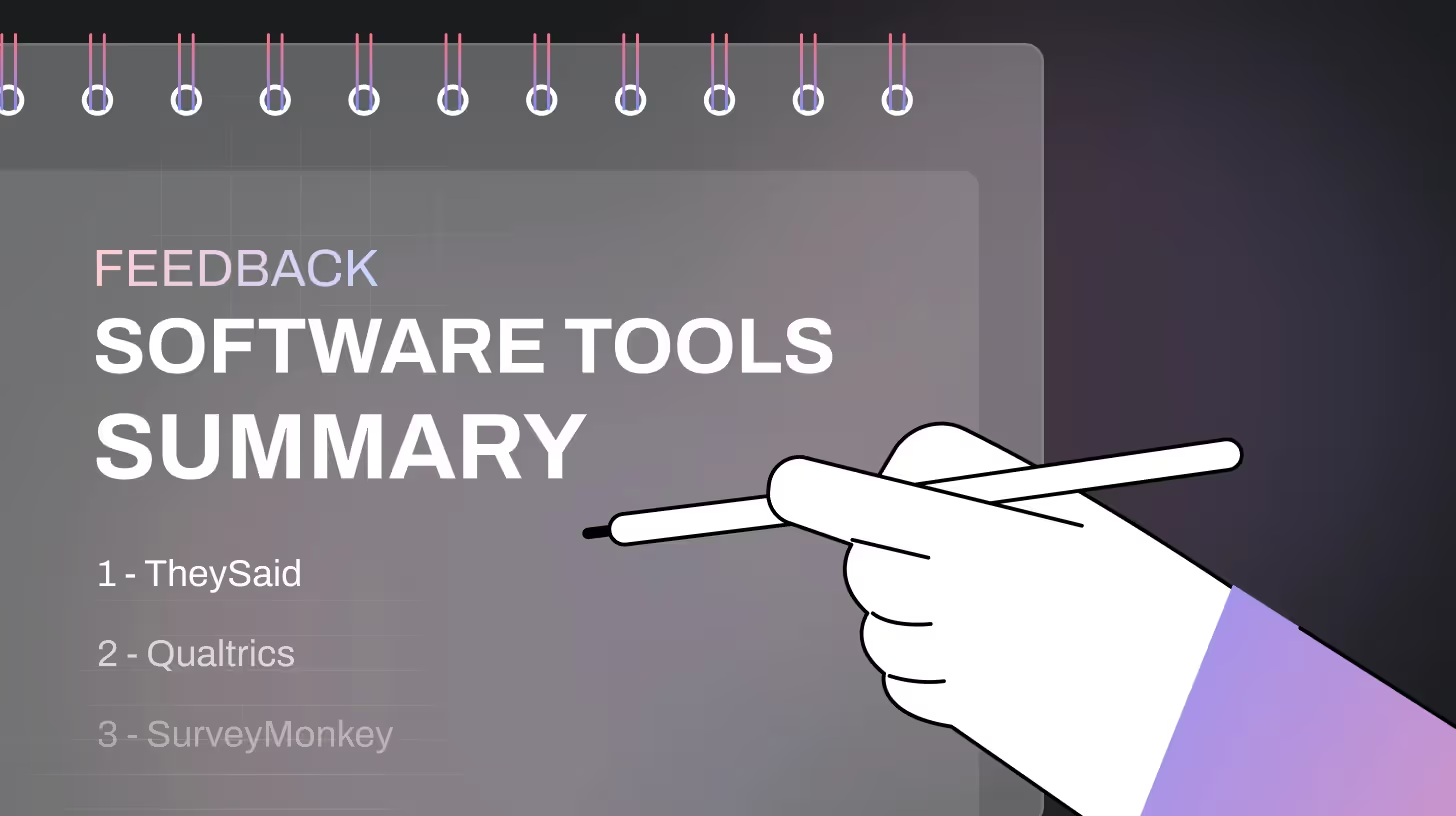
Did you know that employees who receive meaningful feedback are 80% more engaged at work, according to Gallup? Meaningful reviews don’t just boost morale — they directly impact performance, retention, and team culture.
That’s exactly why more organizations are moving away from traditional annual reviews and adopting 360-degree feedback software, where insights come from peers, managers, and direct reports instead of a single perspective. When feedback is multi-sourced, continuous, and honest, it leads to stronger leadership development and faster growth.
But here’s the challenge most teams face:
There are dozens of tools, survey platforms, AI feedback apps, performance systems and each promises something different. Choosing a solution that actually fits your workflow, culture, and growth stage isn’t always simple.
So, I’ve done the heavy lifting for you.
After analyzing features, AI capabilities, user experience, reporting depth, scalability, and pricing, I’ve shortlisted the Top 15 Best 360-Degree Feedback Software including conversational AI tools like TheySaid that go beyond ratings and turn feedback into meaningful development conversations.
With the right 360 feedback software, you can:
- Collect peer, manager & direct-report feedback effortlessly
- Get unbiased insights instead of vague 1–5 scores
- Automate review cycles so HR isn’t chasing people for responses
- Highlight strengths and development areas clearly
- Make growth continuous, not annual and stressful
- Give managers actionable recommendations, instantly
TL;DR
- 360-degree feedback software helps organizations collect multi-rater feedback for fair performance insights and continuous development.
- Tools like TheySaid stand out for AI-driven summaries, adaptive questioning, development paths, and honest feedback conversations.
- This guide compares platforms based on feedback depth, reporting quality, automation workflows, integrations, AI power, and pricing.
- Strong picks for 360-degree feedback software in 2026:
• TheySaid for AI insights and growth-focused feedback cycles
• Qualtrics, Lattice, CultureAmp for mid-to-large performance ecosystems
• Zoho, SurveyMonkey, Jotform for budget-friendly smaller teams
• Workday and Deel for global enterprise HR stacks
Related read: 360 Degree Survey Guide: How to Use Feedback for Growth
Top 15 360-Degree Feedback Software for Better Employee Insights
1.TheySaid
TheySaid is an incredible 360-degree feedback software. It goes beyond generic surveys, offering AI-powered analysis and smart automation to help companies capture honest, actionable feedback at scale. Instead of chasing surface-level ratings, TheySaid helps teams understand why people perform how they do and what they need to grow. Whether for leadership assessments, peer reviews, or team development, it simplifies the process and delivers clear, personalized insights that actually drive growth.
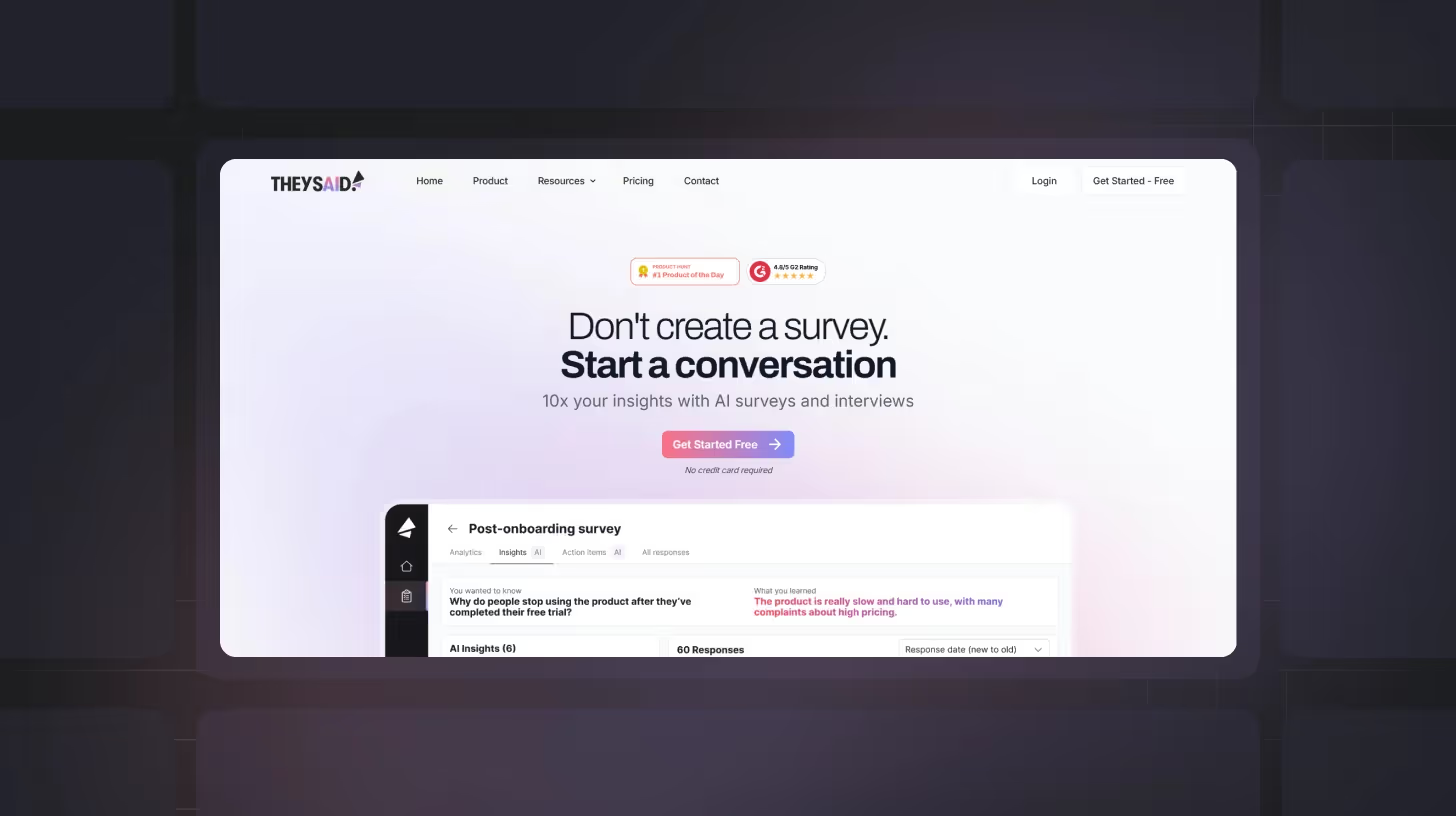
What you will like:
- AI-generated summaries from peers and managers, and direct report feedback.
- A conversation with AI to gather deeper insights on feedback that can really help uncover the root causes behind issues.
- Super smart AI that adapts questions based on responses.
- Highly scalable, making it suitable for both small businesses and large enterprises alike.
- Summarized insights you can actually act on—no manual digging.
- AI Interviews that allow for more honest, detailed feedback.
What you may not like:
- Teams unfamiliar with AI tools may need a short learning curve.
2. Qualtrics
Qualtrics is a well-established experience management platform. It offers advanced survey logic, in-depth analytics, and robust customization options. You can effortlessly design every part of your 360-degree feedback, from who gives feedback to when reminders go out to how the reports are generated. It is well-suited for companies with internal resources to manage complex programs.
What you will like:
- Deliver individualized reports to employees, ensuring confidentiality.
- Identify potential loopholes across the organization and track progress over time.
- Create surveys with skip and conditional logic.
- Offer sentiment analysis features to analyze and visualize emotions.
- Build performance frameworks that match your organization’s goals.
What you may not like:
- Higher pricing, especially for smaller teams.
- Doesn’t offer integrations with common HR platforms.
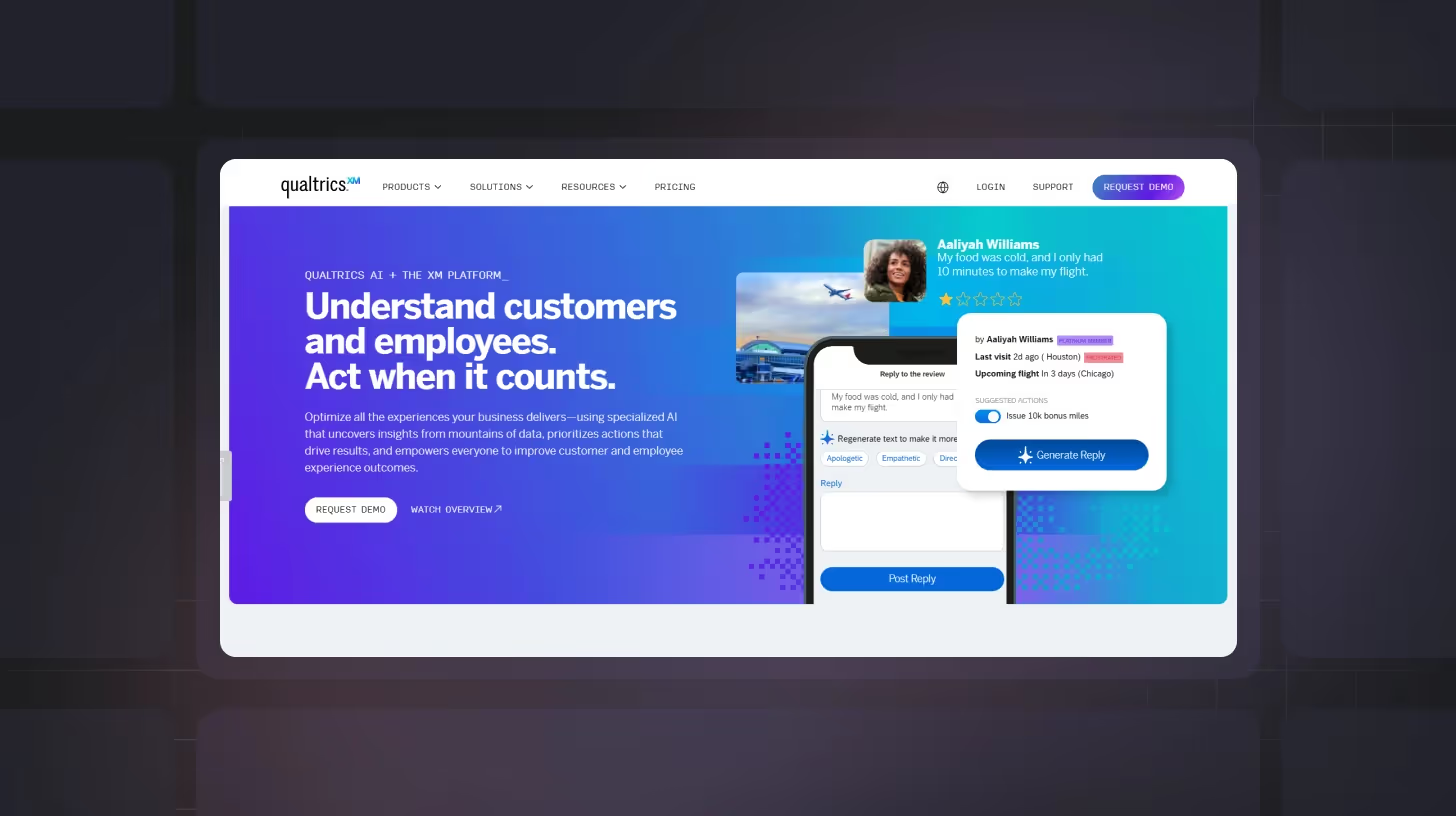
3. Opinion Stage
Opinion Stage is a user-friendly survey maker that marketers and businesses can use to collect 360-degree feedback, employee evaluations, and peer reviews. The surveys have an engaging, one-question-at-a-time format that helps boost completion rates and keep participants interested. You can also add images and videos to clarify questions or make surveys more interactive. This works especially well for 360-degree feedback, where personalized, visual surveys encourage more thoughtful and accurate responses.
What you will like:
- Conversational surveys that reduce fatigue and encourage completion.
- Free forever plan with unlimited surveys and questions.
- AI survey maker and built-in lead generation forms.
- Smart logic and branching that personalize each respondent’s question path.
- Real-time visual analytics to track progress and identify trends.
- Easy integrations with tools like Zoho CRM, Brevo, HubSpot, Salesforce, Zapier, and more.
What you may not like:
- The free plan is limited to 25 responses per month.
- You’ll need to sign up before creating or sharing surveys.
.avif)
4. SurveyMonkey
SurveyMonkey is a widely trusted tool, known for its simplicity and ease of use. With a library of ready-made 360 templates and a drag-and-drop survey builder, SurveyMonkey makes collecting feedback from peers, managers, and direct reports easy. While it doesn’t offer advanced analytics or interview-style insights like some AI tools, it nails the basics at a very affordable price.
What you will like:
- Easily customizable survey templates to suit your 360-degree feedback needs.
- Automated email reminders and response tracking.
- Skip logic and custom branches to personalize the survey flow.
- Intuitive design, no technical skills required.
- No complex configurations are required to create and launch your 360 surveys in minutes.
Integration with tools like Slack and Microsoft Teams (via Zapier).
What you may not like:
- Limited analytics and reporting for deeper insights.
- No built-in interview or AI features.
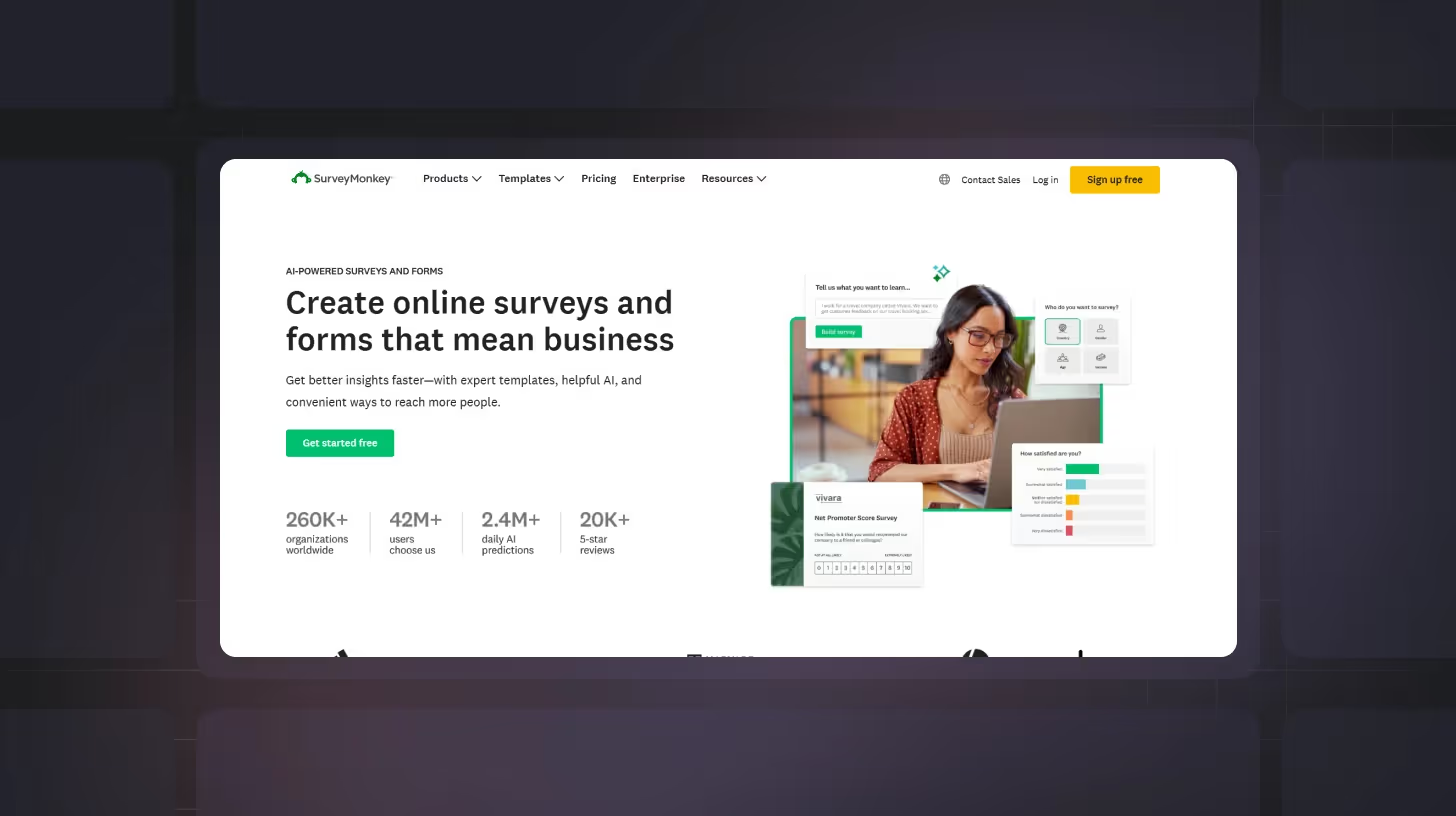
5. ThriveSparrow
ThriveSparrow integrates employee development with individual development plans, making it the core of every 360-degree feedback process. Its user-centric design and highly intuitive interface make it accessible even to companies new to feedback tools.
If you're looking for a straightforward, development-focused tool to help employees grow while collecting meaningful feedback, ThriveSparrow could be a great choice.
What you will like:
- Easy to set up and use, making it ideal for smaller companies or teams.
- Directly ties feedback to actionable learning and development plans.
- Allows tracking assessments seamlessly within the employee portal.
- Stay on top of feedback with immediate alerts and updates.
What you may not like:
- Pricing may be higher for teams that don’t need the full range of features.
6. Lattice
Lattice is a popular performance management software designed to help teams align their goals and drive development. It uniquely blends 360-degree feedback with performance reviews, OKRs (Objectives & Key Results), and one-on-ones all in a single, integrated system. The platform's customizable features and analytics empower HR teams and managers to make data-driven decisions that align with organizational goals.
What you will like:
- Combining feedback, goal setting, and development in one platform.
- Utilize analytics to identify trends and areas for improvement.
- An intuitive design that simplifies navigation and usage.
- Seamlessly connects with various HRIS and communication platforms.
What you may not like:
- The extensive features may be overwhelming for smaller organizations.
- Some users may require time to utilize all the platform's capabilities fully.
7. Performance Pro
Performance Pro is a comprehensive performance management solution. It allows the assignment of feedback questions and rating scales based on roles, departments, or predefined competency models. It also comes with built-in workflows that support formal performance improvement plans (PIPs), salary recommendations, and documentation.
What you will like:
- Includes built-in coaching tools, helping managers give meaningful, structured guidance after feedback.
- Link evaluations to raises, promotions, or development plans.
- Offers compliance support, like automated recordkeeping for audit-readiness and HR best practices.
What you may not like:
- The interface could feel dated compared to newer platforms.
- Doesn’t offer features like instant feedback or modern collaboration.
8. SurveySparrow
SurveySparrow is excellent 360-degree feedback software that turns online surveys into conversations. It is decked with a rich dashboard that offers in-depth reports, graphs, and charts to give you a detailed view. It has a dual UI; depending on your audience, you can switch between a chat-like interface and a classic form layout.
What you will like:
- Offer a pre-built 360-degree feedback assessment that suits your needs.
- Share surveys via email, Slack, MS Teams, or even embed them on websites.
- Have features like question piping and custom parameters to tailor surveys to individual respondents.
- Offers an Offline & Kiosk Mode, which is great for frontline teams or those in non-digital environments.
- Allow to set up recurring 360 feedback cycles and trigger actions based on responses.
What you may not like:
- Some users report challenges integrating with certain HR systems.
- Setting up personalized surveys can be complex without prior experience.
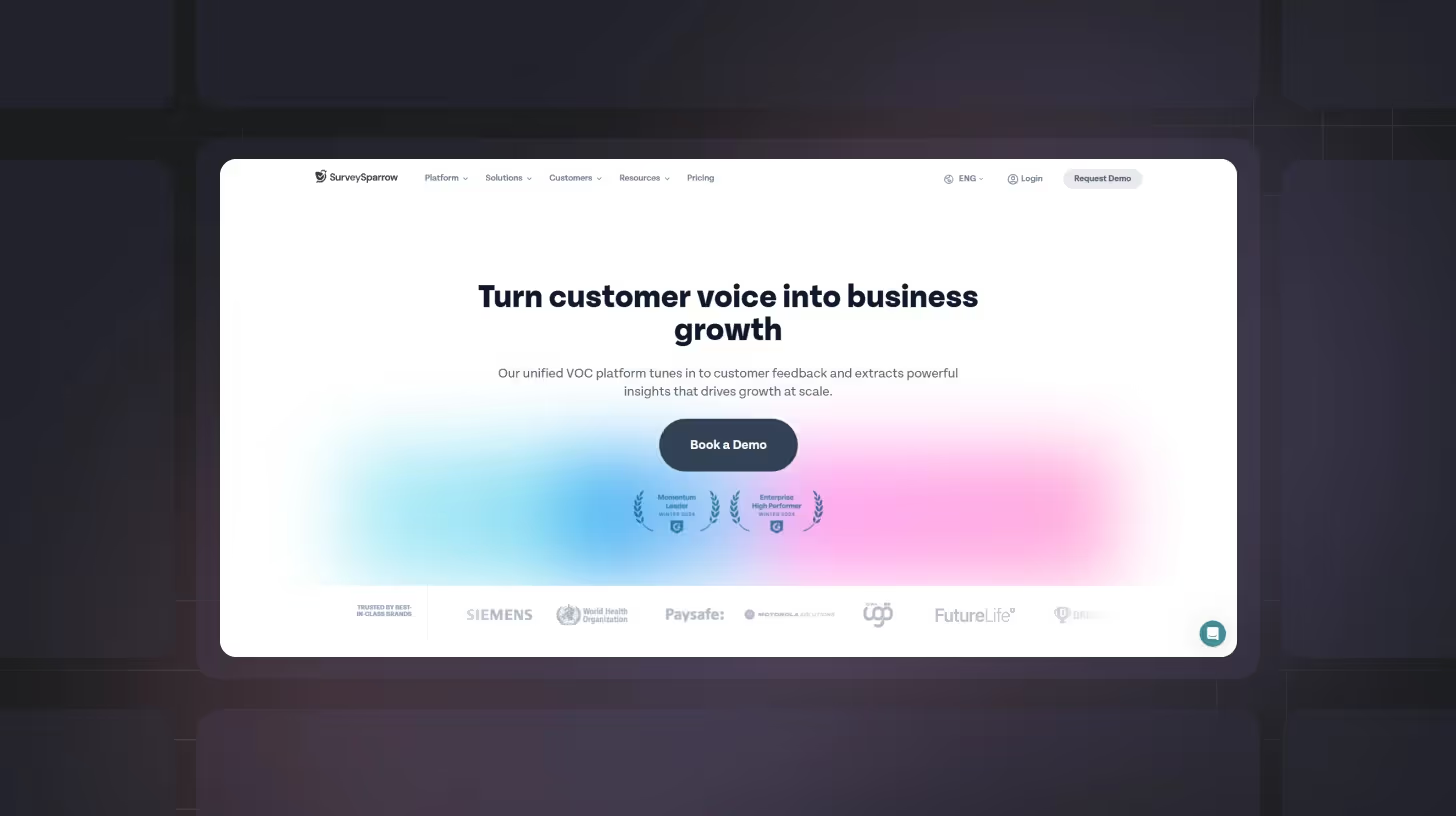
9. Zoho Survey
Zoho Survey is part of the larger Zoho ecosystem, making it ideal for organizations already using Zoho’s HR, CRM, or productivity tools. It offers a surprisingly powerful 360-degree feedback solution with a strong focus on affordability, customization, and secure data collection.
What you will like:
- One of the most affordable tools on the list, especially for small to mid-sized businesses.
- Seamless integration if you already use Zoho People, Zoho CRM, or Zoho Analytics.
- Use skip logic, piping, and advanced branching to personalize feedback paths.
- Create surveys in multiple languages to accommodate global teams.
- GDPR-compliant with role-based access controls.
What you may not like
- Doesn’t include AI insights, goal tracking, or built-in coaching tools.
10. 15Five
15Five is a performance management platform that includes 360-degree feedback as part of its broader toolkit. Designed to support employee growth and engagement, it offers features like check-ins, 1-on-1s, OKRs, feedback requests, and self-reviews all in one place.
What you will like:
- Offers Weekly check-ins with customizable questions and a dedicated HR results dashboard.
- Use historical data and trends to identify key patterns and design performance review cycles.
- Combines 360 feedback, performance reviews, goal tracking, and engagement surveys in a unified platform.
What you may not like:
- Limited OKR and goal management features in the core plan.
- With so many features, onboarding and adoption may take time, especially for smaller companies.
11. Culture Amp
Culture Amp is one of the most well-known platforms in the employee experience space. Its 360-degree feedback capabilities are robust and research-backed. It’s designed for companies that care deeply about culture, development, and data-driven insights.
It's especially popular among mid-to-large-sized companies that build high-performing, people-first cultures.
What you will like:
- Developed with I/O psychologists, the platform uses research-backed survey designs to ensure fair and effective feedback.
- Offers personalized insights to help individuals and managers grow after each review.
- Categorize feedback by department, seniority level, and more.
- Compare your team against thousands of global companies through benchmarking.
What you may not like:
- Robust features mean a steeper onboarding curve.
- Designed more for structured review cycles than ongoing check-ins.
12. Leapsome
Leapsome is robust performance management software with a user-friendly interface and an intuitive dashboard to navigate the platform. It seamlessly blends 360-degree feedback with performance reviews, goals (OKRs), learning, and engagement tools. You can run structured 360 reviews and tie the results directly to learning paths and development plans.
What you will like:
- Tie feedback to personalized learning modules and career tracks.
- Cloud-based with Slack, Teams, and calendar integrations.
- Align individual feedback with company goals to keep teams focused and accountable.
What you may not like:
- Some users feel it can get “too layered” if you already use OKRs or learning tools.
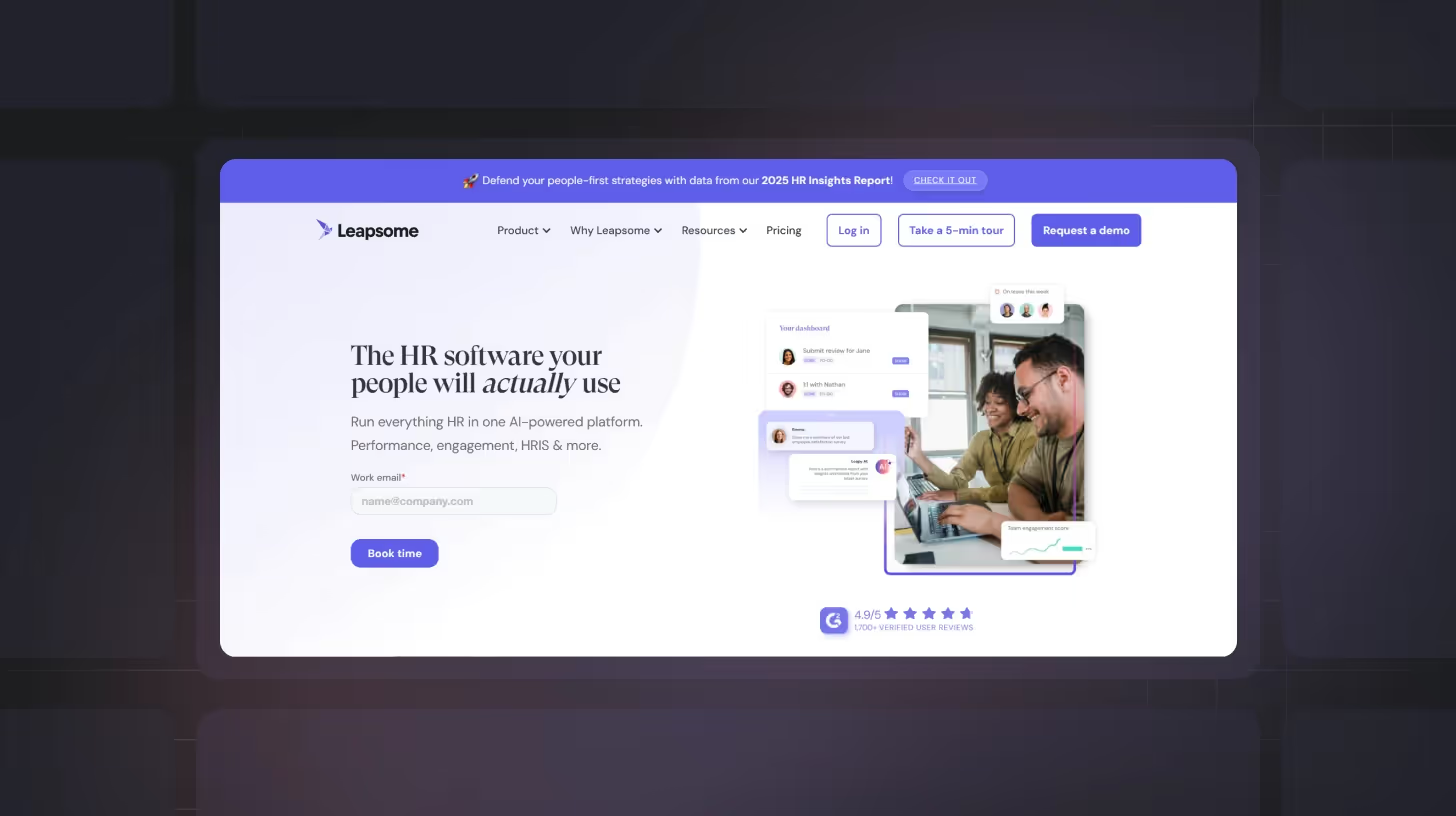
13. Deel
Deel is best known as a global HR and payroll platform, but in 2025, it expanded into performance management, including 360-degree feedback features. That means companies managing international teams can now run feedback cycles, reviews, and development conversations all within the platform they use to onboard, pay, and support global talent.
What you will like:
- Run reviews without switching between platforms.
- Supports contractors and full-time employees in 100+ countries, perfect for multinational organizations.
- Manage hiring, feedback, payroll, and performance in one place.
- Clean interface with easy setup for performance reviews.
- Handles teams of all sizes, from startups to global enterprises.
What you may not like:
- Feedback templates and workflows may feel basic for advanced HR teams.
- It may not be worth it if you only need 360-degree feedback and not global HR services.
14. Jotform
Jotform is primarily known for its versatile online form-building capabilities. Still, it also offers 360-degree feedback surveys with flexibility and ease that make it stand out in a crowded market. Ideal for teams needing a straightforward, customizable survey tool without a steep learning curve, JotForm lets you easily create and share 360-degree feedback forms using a simple drag-and-drop interface.
What you will like:
- Drag-and-drop form builder makes it easy to create and share surveys.
- Tailor your 360 feedback surveys with custom questions, branding, and design.
- Easily integrates with platforms like Google Sheets, Slack, and CRM tools for seamless workflow.
- Great for smaller businesses or teams on a budget.
What you may not like:
- Lacks the deep, actionable insights that other 360-degree feedback tools offer.
- Doesn’t include advanced HR-specific features, like performance tracking or goal-setting.
15. BambooHR
BambooHR is widely recognized for streamlining core HR tasks from hiring and onboarding to payroll and time tracking. However, it has also stepped into the performance space in recent years, offering 360 feedback features through its Performance Management add-on. It’s a solid choice for small to mid-sized companies that want to run simple, structured reviews without leaving their HR platform.
What you will like:
- Run 360 feedback in the same place you manage employee records and performance.
- Clean, intuitive design that makes review cycles simple for employees and managers alike.
- Easily set up and automate review timelines and feedback requests.
- Supports full-circle feedback with structured templates.
- All performance data lives in the same system as other HR insights.
What you may not like:
- Lacks deep analytics, AI insights, and development-focused features.
16. Workday
Workday is one of the most robust HR platforms on the market, and its 360-degree feedback capabilities reflect that enterprise-level depth. Designed for large organizations, Workday enables companies to run structured feedback cycles, integrate performance data with broader HR systems, and maintain compliance across global teams.
What you will like:
- Built for large orgs with complex structures and compliance needs.
- Feedback, goals, compensation, and talent management all work together.
- Ideal for teams spread across regions, business units, and roles.
- Get deep insights into performance trends across the entire workforce.
- Build feedback cycles tailored to leadership, departments, or projects.
What you may not like:
- Requires more time and admin support to implement effectively.
- Employees may find the interface less intuitive than modern standalone tools.
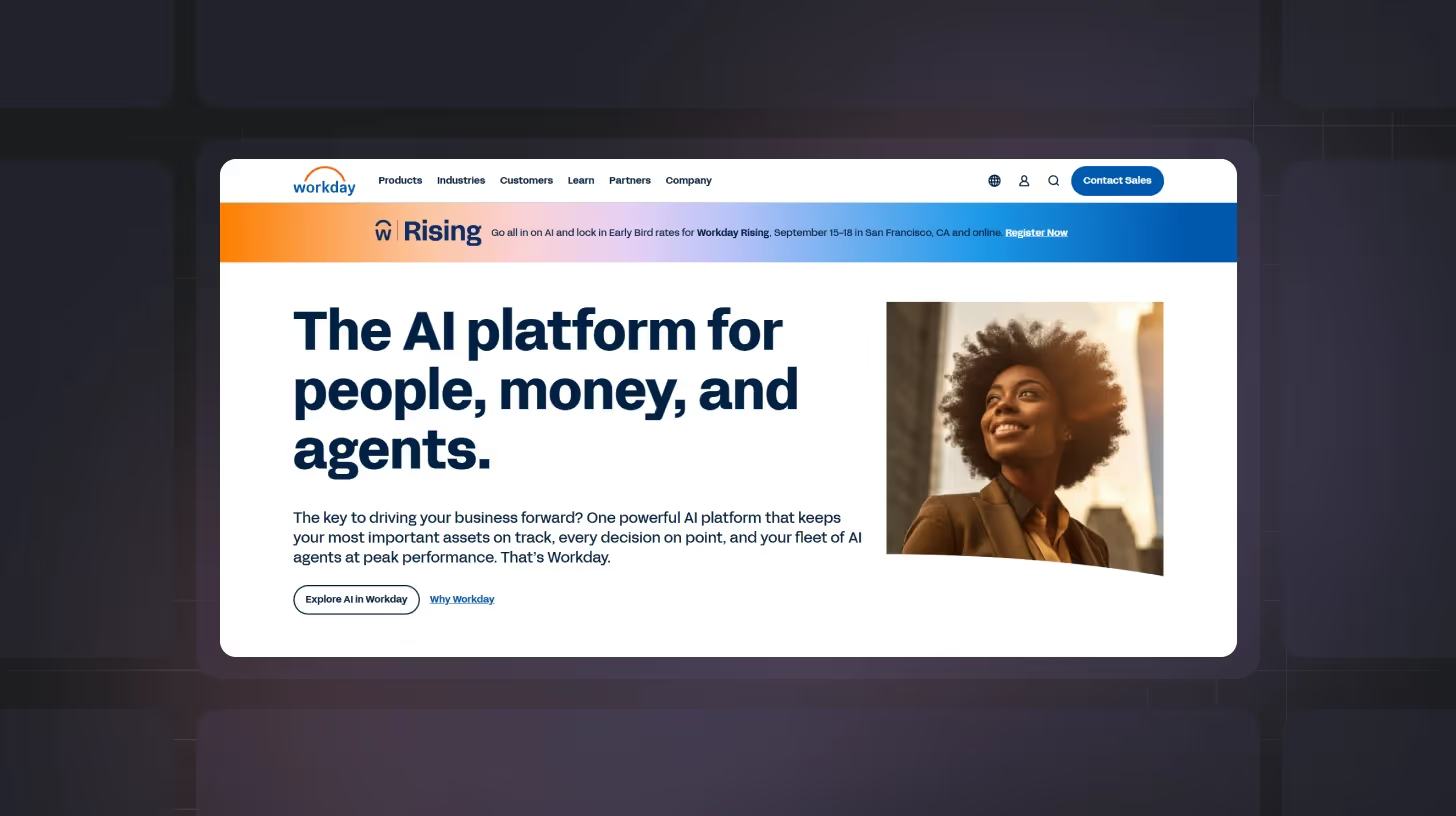
360-Degree Feedback Software Tools Summary
Also Read: Top 360 Degree Appraisal Questions to Boost Honest Feedback
Key Takeaways
- Choose software that fits your team's culture, not just the features list.
- Tools like TheySaid focus on turning feedback into two-way, ongoing dialogue, making people feel heard, not evaluated.
- Save hours of manual work by using TheySaid's AI to analyze themes, summarize responses, and recommend next steps automatically.
- Remember that success lies in making employees feel safe, supported, and inspired to grow, no matter which tool you choose.
FAQs
What is 360-degree feedback software?
It’s a performance tool that collects feedback from an employee’s peers, managers, direct reports, and sometimes even customers to offer a full view of their strengths and development areas.
Who benefits most from using 360-degree feedback tools?
Companies focused on continuous employee development, performance improvement, and building a feedback-rich culture, especially mid-sized to large organizations.
How do I choose the right software?
Consider your organization’s size, goals, budget, and the features you need (e.g., AI, goal tracking, integrations, multilingual support).





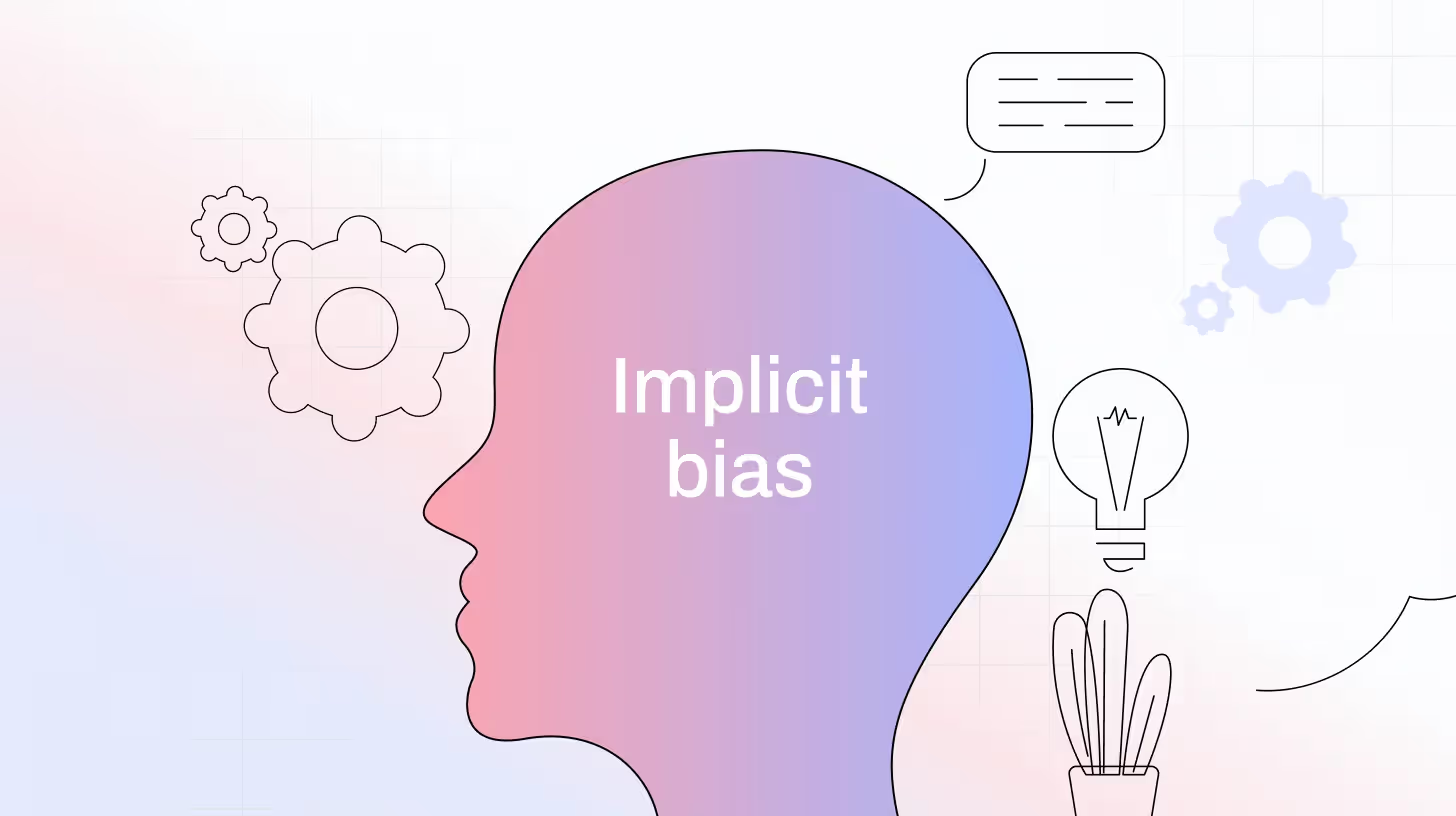










.svg)